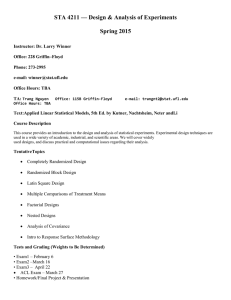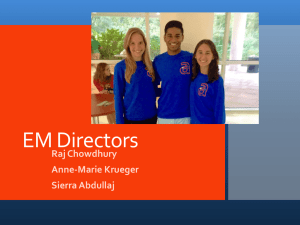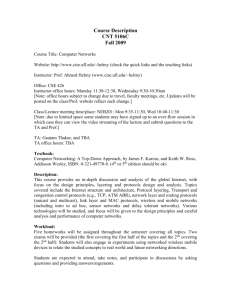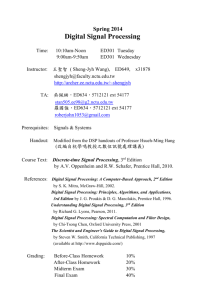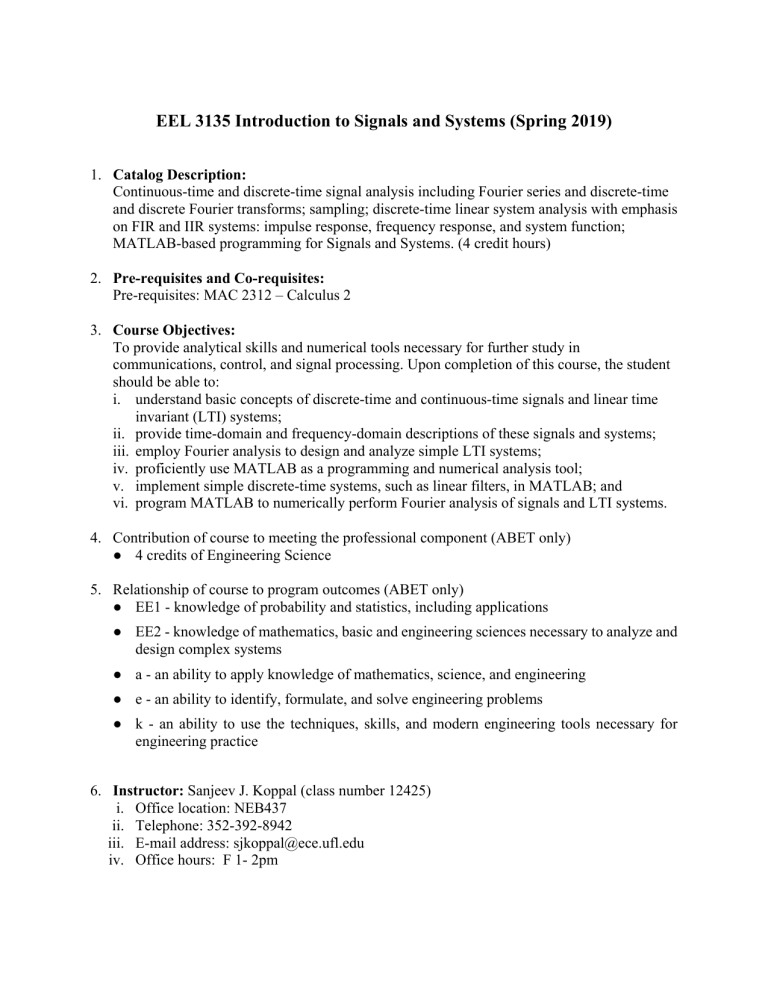
EEL 3135 Introduction to Signals and Systems (Spring 2019) 1. Catalog Description: Continuous-time and discrete-time signal analysis including Fourier series and discrete-time and discrete Fourier transforms; sampling; discrete-time linear system analysis with emphasis on FIR and IIR systems: impulse response, frequency response, and system function; MATLAB-based programming for Signals and Systems. (4 credit hours) 2. Pre-requisites and Co-requisites: Pre-requisites: MAC 2312 – Calculus 2 3. Course Objectives: To provide analytical skills and numerical tools necessary for further study in communications, control, and signal processing. Upon completion of this course, the student should be able to: i. understand basic concepts of discrete-time and continuous-time signals and linear time invariant (LTI) systems; ii. provide time-domain and frequency-domain descriptions of these signals and systems; iii. employ Fourier analysis to design and analyze simple LTI systems; iv. proficiently use MATLAB as a programming and numerical analysis tool; v. implement simple discrete-time systems, such as linear filters, in MATLAB; and vi. program MATLAB to numerically perform Fourier analysis of signals and LTI systems. 4. Contribution of course to meeting the professional component (ABET only) ● 4 credits of Engineering Science 5. Relationship of course to program outcomes (ABET only) ● EE1 - knowledge of probability and statistics, including applications ● EE2 - knowledge of mathematics, basic and engineering sciences necessary to analyze and design complex systems ● a - an ability to apply knowledge of mathematics, science, and engineering ● e - an ability to identify, formulate, and solve engineering problems ● k - an ability to use the techniques, skills, and modern engineering tools necessary for engineering practice 6. Instructor: Sanjeev J. Koppal (class number 12425) i. Office location: NEB437 ii. Telephone: 352-392-8942 iii. E-mail address: sjkoppal@ece.ufl.edu iv. Office hours: F 1- 2pm 7. Instructor: Joel Harley (class number 12426) i. Office location: NEB 441 ii. Office hours: TR 3:00 AM – 4:00 AM, NEB 441 iii. Telephone: 352-392-2692 iv. E-mail address: joel.harley@ufl.edu 8. Teaching Assistants: To Be Announced! i. Madalyn Danielak, Office: TBA, ii. Kadeem Samuel, Office: TBA, iii. Chris Stauffer, Office: TBA, iv. Sabrina Edelmann, Office: TBA, v. Patrick (Benji) Roberts, Office: TBA, vi. Cory Arthur, Office: TBA, E-mail: TBA E-mail: TBA E-mail:TBA E-mail: TBA E-mail: TBA E-mail: TBA 9. Meeting Times and Location: Class number 12425 T,R | Period 3 - 4 (9:35 AM - 11:30 AM) Class number 12426 T,R | Period 9 - 10 (4:05 PM - 6:00 PM) Office Hours: TBA Office Hours: TBA Office Hours: TBA Office Hours: TBA Office Hours: TBA Office Hours: TBA LAR 310 LAR 310 10. Lecture videos, readings, and tutorials will be posted on Canvas before classes. It is MANDATORY that you watch them before the designated class period. You WILL be quizzed and tested on this material. 11. Class/Workshop schedule: 3 sessions of 75-min. lecture/problem/HW and 1 session of 75-min. MATLAB programming workshop (“lab”) each week 12. Quizzes: i. Little quiz (on lecture videos): 5 minutes each week ii. Big quiz (Lab+CW+HW): 20 minutes each week 13. Grading Breakdown: i. Midterm Exam: ii. Final Exam: iii. Classwork/Homework: iv. Graded Labs: v. Little Quizzes: vi. Big Quizzes: 20% 20% 10% 25% 5% 20% 14. If your final exam score is greater than your midterm score, then the midterm will be dropped and the final will count for 40% of the grade. 15. Material and Supply Fees: $99 for student edition of MATLAB with toolboxes or $50 without toolboxes. $$$ for coffee and snacks to sustain hours and hours of hard work. 16. Textbooks and Software Required: a. Title: DSP First b. c. d. e. Authors: J. H. McClellan, R. W. Schafer, and M. A. Yoder Publication date and edition: 2016, 2nd edition ISBN number: 0-13-601925-0 MATLAB Student Version, MathWorks, Inc. 17. Recommended Reading: a. A. V. Oppenheim and A. S. Willsky, Signals and Systems, Prentice Hall, 2nd ed., 1997. (ISBN 0-13-814757-4) 18. Course Outline: Class 1 2 3 4 5 6 7 8 9 10 11 12 13 14 15 16 17 18 19 20 21 22 23 24 25 26 27 28 29 30 31 32 33 Topic Overview & Introduction Sinusoids Complex exponentials & phasors Sums and products of sinusoids & frequency spectrum Fourier series Time-frequency spectrum Sampling Reconstruction Discrete-time systems FIR filters FIR filters (cont.) Discrete-time LTI systems & convolution Discrete-time LTI systems & convolution (cont.) FIR frequency, transient, and steady-state responses More about freq. response FIR filtering examples FIR filtering examples Discrete-time Fourier transform Discrete-time Fourier transform (cont.) Time- vs. freq- domain analysis z-Transform More about z-Transform Zeros & poles Elementary filter designs Elementary filter designs (cont.) Elementary filter designs (cont.) IIR filters IIR system (transfer) function IIR freq. response Inverse z-Transform Inverse z-Transform (cont.) Second-order and higher order IIR filters Second-order and higher order filters (cont.) Text 1 2.1-2.4 2.5-2.8 3.1-3.3 3.4-3.5 3.6-3.7 4.1-4.2, 4.4, 4.5 4.3 5.1-5.2 5.3-5.5, 5.9 5.3-5.5, 5.9 5.6-5.8 5.6-5.8 6.1-6.3 6.4-6.6 6.7-6.8 6.7-6.8 7.1-7.4 7.1-7.4 9.1-9.3 9.4-9.5 9.6 9.7-9.9 9.7-9.9 9.7-7.9 10.1-10.2 10.3-10.6 10.7-10.8 10.9-10.10 10.9-10.10 10.11-10.13 10.11-10.13 34 35 36 37 38 39 40 Numerical analysis in time, frequency, and z domains Discrete-time Fourier series Discrete-time Fourier series (cont.) Discrete Fourier transform Discrete Fourier transform (cont.) Fast Fourier transform Fast Fourier transform (cont.) 8.5 8.5 8.1-8.4, 8.7 8.1-8.4, 8.7 8.8 8.8 19. Attendance and Expectations: a. Class attendance is required. b. Attendance at each programming workshop session is mandatory: before each scheduled workshop period, you are expected to complete the “prelab” and “warmup” sections, and submit a short report via Canvas. Unexcused failure to attend a workshop session will result in a letter grade reduction from your final grade. c. Tentative list of workshop sessions: Lab Topic 0 Introduction to MATLAB in Signals and Systems 1 Introduction to Sinusoids, Complex Exponents & Phasors 2 Multipath Interference 3 Synthesis of sinusoidal signals: Music synthesis 4 Echoes and Images: A/D and D/A, convolution and FIR filtering 5 Adaptive filtering: Vacuum cleaner noise cancellation 6 Octave band filtering: Equalizer 7 IIR filter design via pole-zero placement: Vowel synthesis 8 Digital Communication, FSK Signal 9 Fast Fourier Transform of Biological Signals (heart rate lab) d. Reports: After each lab, you are required to finish “in-lab” portion and submit your solutions in a report. Your report should be self-sufficient i.e., the report should be self-explanatory. e. Pay attention to the workflow. There will be one quiz every class day except midterm week; one weekly big quiz, one weekly little quiz. Homework and lab reports will generally be due every week. DO NOT FALL BEHIND. 20. Grading Scale: 95-100 A, 90-94 A-, 85-89 B+, 80-84 B, etc. (may change to match class average) 21. Make-up Exam Policy: No make-up exam. Other important course information: Students Requiring Accommodations Students with disabilities requesting accommodations should first register with the Disability Resource Center (352-392-8565, https://www.dso.ufl.edu/drc) by providing appropriate documentation. Once registered, students will receive an accommodation letter which must be presented to the instructor when requesting accommodation. Students with disabilities should follow this procedure as early as possible in the semester. Course Evaluation Students are expected to provide feedback on the quality of instruction in this course by completing online evaluations at https://evaluations.ufl.edu/evals. Evaluations are typically open during the last two or three weeks of the semester, but students will be given specific times when they are open. Summary results of these assessments are available to students at https://evaluations.ufl.edu/results/. University Honesty Policy UF students are bound by The Honor Pledge which states, “We, the members of the University of Florida community, pledge to hold ourselves and our peers to the highest standards of honor and integrity by abiding by the Honor Code. On all work submitted for credit by students at the University of Florida, the following pledge is either required or implied: “On my honor, I have neither given nor received unauthorized aid in doing this assignment.” The Honor Code (https://www.dso.ufl.edu/sccr/process/student- conduct-honor-code/) specifies a number of behaviors that are in violation of this code and the possible sanctions. Furthermore, you are obligated to report any condition that facilitates academic misconduct to appropriate personnel. If you have any questions or concerns, please consult with the instructor or TAs in this class. Software Use All faculty, staff, and students of the University are required and expected to obey the laws and legal agreements governing software use. Failure to do so can lead to monetary damages and/or criminal penalties for the individual violator. Because such violations are also against University policies and rules, disciplinary action will be taken as appropriate. We, the members of the University of Florida community, pledge to uphold ourselves and our peers to the highest standards of honesty and integrity. Student Privacy There are federal laws protecting your privacy with regards to grades earned in courses and on individual assignments. For more information, please see: http://registrar.ufl.edu/catalog0910/policies/regulationferpa.html Campus Resources: Health and Wellness U Matter, We Care: If you or a friend is in distress, please contact umatter@ufl.edu or 352 392-1575 so that a team member can reach out to the student. Counseling and Wellness Center: http://www.counseling.ufl.edu/cwc, and 392-1575; and the University Police Department: 392-1111 or 9-1-1 for emergencies. Sexual Assault Recovery Services (SARS) Student Health Care Center, 392-1161. University Police Department at 392-1111 (or 9-1-1 for emergencies), or http://www.police.ufl.edu/. Academic Resources E-learning technical support, 352-392-4357 (select option 2) or e-mail to Learningsupport@ufl.edu. https://lss.at.ufl.edu/help.shtml. Career Resource Center, Reitz Union, 392-1601. Career assistance and counseling. https://www.crc.ufl.edu/. Library Support, http://cms.uflib.ufl.edu/ask. Various ways to receive assistance with respect to using the libraries or finding resources. Teaching Center, Broward Hall, 392-2010 or 392-6420. General study skills and tutoring. https://teachingcenter.ufl.edu/. Writing Studio, 302 Tigert Hall, 846-1138. Help brainstorming, formatting, and writing papers. https://writing.ufl.edu/writing-studio/. Student Complaints Campus: https://www.dso.ufl.edu/documents/UF_Complaints_policy.pdf. On-Line Students Complaints: http://www.distance.ufl.edu/student-complaint-process.
